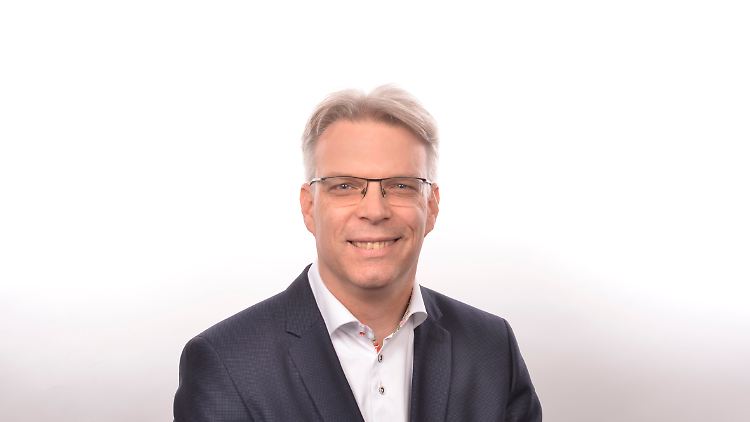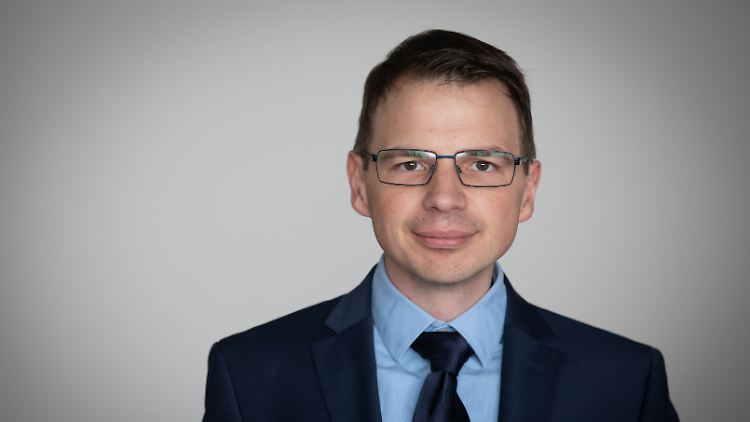Skilled labor shortages and unfilled positions on the one hand, hundreds of thousands of refugees on the other. In an interview with ntv.de, experts from IW Cologne explain why the two sides don’t always fit together – and what is missing for successful labor market integration.
Wido Geis-Thöne is a senior economist for family policy and migration issues at the German Economic Institute in Cologne.
(Photo: Uta Wagner / IW Cologne)
ntv.de: In order to compensate for demographic change, Germany would need a net immigration of 400,000 to 500,000 people per year, according to the Institute for Labor Market and Vocational Research. According to the BAMF, 244,000 people applied for asylum in 2022. To what extent can these people contribute to the shortage of skilled workers?
Dirk Werner: First of all, we have to make a strict distinction between skilled workers who come to Germany to work – i.e. migrant workers – and refugees. These are completely different groups.
Wido Geis-Thöne: Most refugees come from a situation in which their lives are completely shattered. You can only plan for the next few days and cannot build long-term perspectives.

Dirk Werner, is head of the vocational qualification and specialists cluster at the German Economic Institute in Cologne.
Werner: Them 244,000, that you mentioned, or the well over 1 million from Ukraine, they come for one reason: to seek protection here. As a rule, your potential for the job market must first be found and awakened. This takes a while.
What hurdles do you encounter when looking for this potential for the job market?
Geis-Thöne: The educational level of the people who come to us as refugees is often not compatible. In many areas, access to the labor market is therefore still very difficult. However, a lot of supporting infrastructure has been created since 2015 and 2016. That is why we are actually seeing great progress in labor market integration among the refugees who arrived in the middle of the last decade. However, we are not yet at the same level as other immigrant groups.
Why is it so much more difficult for refugees to successfully integrate into the job market?
Werner: Integration into work can only begin when people stay with us longer, when their asylum status is clarified at some point and when they learn the German language. This can take a while. That’s why I wouldn’t mention this group in the first round when it comes to securing skilled workers. Much more important in addressing the shortage of skilled workers is the targeted recruitment of skilled workers from abroad.
The people who come to Germany as refugees are on average under 30 years old and could start training that offers them a secure future and at the same time alleviates the shortage of skilled workers.
Werner: The glass is definitely half full. We have achieved a lot when it comes to integration. In vocational training, for example, we have significantly more foreigners and people from the refugees’ main countries of origin in training, who also help us with the shortage of skilled workers. In the last eight years we have had over 50 percent more trainees with this background – in contrast, we have 15 percent fewer German trainees. The training market would look completely different without immigration…
…but?
Werner: But we have to make better use of the potential. The problem for refugees is often that the language requirements in vocational school lessons represent a major hurdle. They prove themselves in practice, but the theoretical test becomes a problem. That’s why they need support and good companionship.
Are the language courses for refugees not enough?
Geis-Thöne: We have created a number of opportunities, especially in the area of integration courses. Refugees with prospects of staying have access to a variety of municipal services. The problem is the refugees with no prospects of staying, for whom the whole thing is very difficult given the uncertainty about where they will continue to stay.
Werner: The question of language doesn’t just start with the integration courses, but also in the daycare centers and schools – not just for refugees, but for all people with a migration background. And we simply have a massive amount of catching up to do.
There are many reports about refugees who would like to work but are not allowed to. Isn’t that counterproductive?
Werner: At my daughter’s school we had a mother who had fled Ukraine with her children. She taught English in Ukraine, speaks German and was really able to help with linguistic integration. In Germany you have to have studied two subjects in order to become a teacher. So it couldn’t be set. These are things that annoy me – we are not flexible enough in our regulations to find innovative solutions. This also annoys many companies, who are then left alone with this question.
Geis-Thöne: Fortunately, a lot has changed in the last few decades. In the 1990s and 2000s, refugees were simply not allowed to work. They had the unfortunate situation of being on the fringes of society until their case was completed and their integration could then be taken care of. That’s different now. Since 2016, asylum seekers have also had the opportunity to work.
Several federal states wanted asylum seekers to be able to withdraw their application or, after rejection, apply for a work permit instead.
Geis-Thöne: That would be advantageous for people who have been here for a long time, have integrated well and can therefore switch from a tolerated status to a regular residence permit. But that’s nothing for low-skilled refugees.
Given the shortage of skilled workers, wouldn’t it be worthwhile to launch a massive investment offensive and help this group of people with language acquisition and training? The demand for workers is there.
Geis-Thöne: If we think about demand, the smartest thing would be to bring people to Germany who we know will integrate well into the job market and have a good chance of staying here. This is the ideal way.
Werner: There are people who came to Germany as refugees, i.e. for reasons of persecution, and not to work here. This is a very heterogeneous group. We have everything up to and including illiterate people, where integration is very challenging, where you need a lot of resources to impart a level of qualification that we have here in the high-tech world of work in Germany.
That sounds like an almost impossible task.
Geis-Thöne: If we look back to the 1990s, we had major integration problems here in our community of Turkish origin in Germany. It has now become a very central pillar of society. Many things don’t happen overnight. These are things that take decades and sometimes only succeed in the second generation. Nevertheless, the investment is worth it. You can’t just look at the present.
Clara Suchy spoke to Dirk Werner and Wido Geis-Thöne
